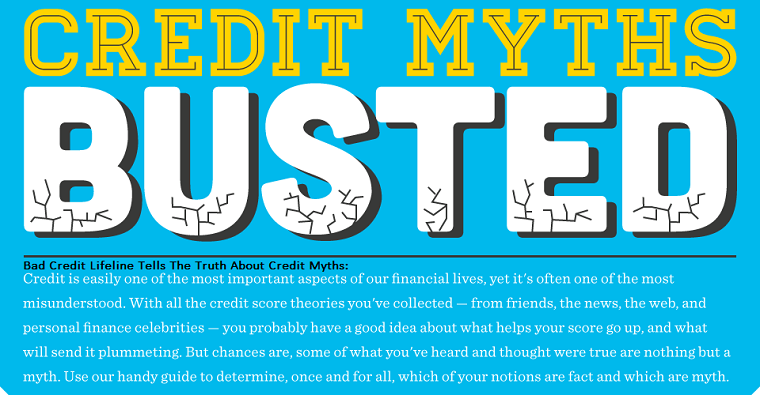
Top 10 Credit Score Myths
The Top Credit Score Myths that You Need to Know the Truth About
If you have tried figuring out credit scores, then chances are that you have fallen for some myth about them. As important as having a good credit score is, you shouldn’t believe in everything that you hear since these stories and ideas being perpetuated can often leave you with a bad credit score. Thus, before you believe the next story about credit score, be sure you at least know these ones.
1. You believe your credit score is good
Chances are high that you have said and believed this one. There is a huge difference between knowing and believing what your credit score really is. Just because it was great three years ago does not mean that that is still the case. Thus, you should ensure that you get copies of your free annual credit report, review, and also check that it is accurate. Often times, you will realize that you missed doing something and that it negatively affected your score.
2. Closing your credit cards will improve your score
There is some common belief among those with bad credit that they can improve their score by closing their credit card accounts. As good as this sounds, this is not true.
Your debt to credit ratio is one of the influencing factors that determine your score. Thus, if you close your accounts all at once, it can have a drastic effect on your score. This is because retaining a balance on them even after you have closed will affect your rating.
If you really want to close your accounts, you should ensure that you have cleared all the balances. Additionally, you should close them gradually, preferably space them out every few months and ensure that you do not make any more applications for credit cards. This way, you will be able to monitor the impact your actions have on your score.
Finally, you should ensure that you thoroughly scrutinize your credit card statements for any suspicious transactions that you have not done yourself.
3. You will reduce your credit score by checking your statement
The majority of people have this idea that if they check what their credit score is, they will end up losing some points. Unlike a test were sneaking a peak is not allowed and can get you disqualified, knowing your credit score is your right. You are allowed to check on it without any sort of restrictions. This action is referred to as a soft inquiry.
However, if your lender or someone else does it to ascertain your creditworthiness, often referred to as a hard inquiry, it will have a negative impact on your credit score. Thus, before you go making credit card applications, you should know that they fall under hard inquiries.
4. Your income affects your credit score
For those with a low income, this is a common misconception. The only impact that your salary can have is if it influences your ability to pay your bills. Thus, your income is not one of the influencing factors when your credit score is being evaluated.
5. Your spouse’s credit score does not affect yours
Whatever score your spouse may have, it’s theirs, plain and simple. This is because credit scores are not cumulative scores like the performance of an institution. For example, when you take out a mortgage, both your scores will be evaluated to ascertain if you will be given the mortgage. If one of you is found to have a bad score, you can end up being denied the mortgage.
6. You cannot get a loan with a bad credit score
This is a big fallacy. There are many lenders who are willing to give you a loan even with your bad credit. There are those which are referred to as bad credit loans and others which are called title loans. However, for these loans, you should be prepared to put up collateral in the form of a car or a house in addition to paying high-interest rates. Thus, you should conduct thorough research to ensure that you do not fall for predatory lending offers which will expose you to steep loans and repayment terms.
7. Your finances affect your score
Anything that pertains to your investment and bank accounts, as well as your personal finances, has no impact on your credit score. However, taking out an overdraft and leaving it unpaid does. Therefore, you should ensure that you pay off your overdraft and clear all unpaid fees promptly prior to closing your accounts.
8. Disputing an account will eliminate it
Since this will entail filing a dispute with the credit bureau, it will result in your claim being investigated. If the information is found to be accurate, your account will not be removed. In essence, this hard inquiry will further worsen your credit score.
9. You can neglect your credit score if not applying for any
This is similar to saying that you do not need a medical checkup because the pain you have had for 3 years simply went away overnight. Simply because you do not need any credit does not mean that you should become negligent when it comes to your financial matters.
You should know that it is not only lenders who check your credit but also potential employers and insurance institutions. Thus, if you have been negligent, it could cost you your job and insurance when you do apply. Additionally, it could take you years to improve your credit so you should ensure that you always adhere to good financial habits.
10. Credit scores are locked in for six months
You should know that your credit score changes as soon as new information comes to light. This can be daily, weekly, monthly, or even yearly. Thus, the importance of good financial habits cannot be taken lightly. You should always ensure that you are making soft inquiries to find out your credit score position so that if need be, you can know which areas you should improve on.
Thus, the best way you can ensure that your credit score remains up to par is by regularly checking your score, checking your statements, consulting with your burnisher for any mistakes made, and practicing good financial habits. If you do this, your credit score will improve. Additionally, even if it is good, you can determine ways in which you can optimize it.

